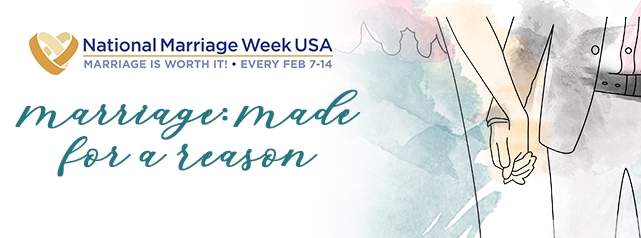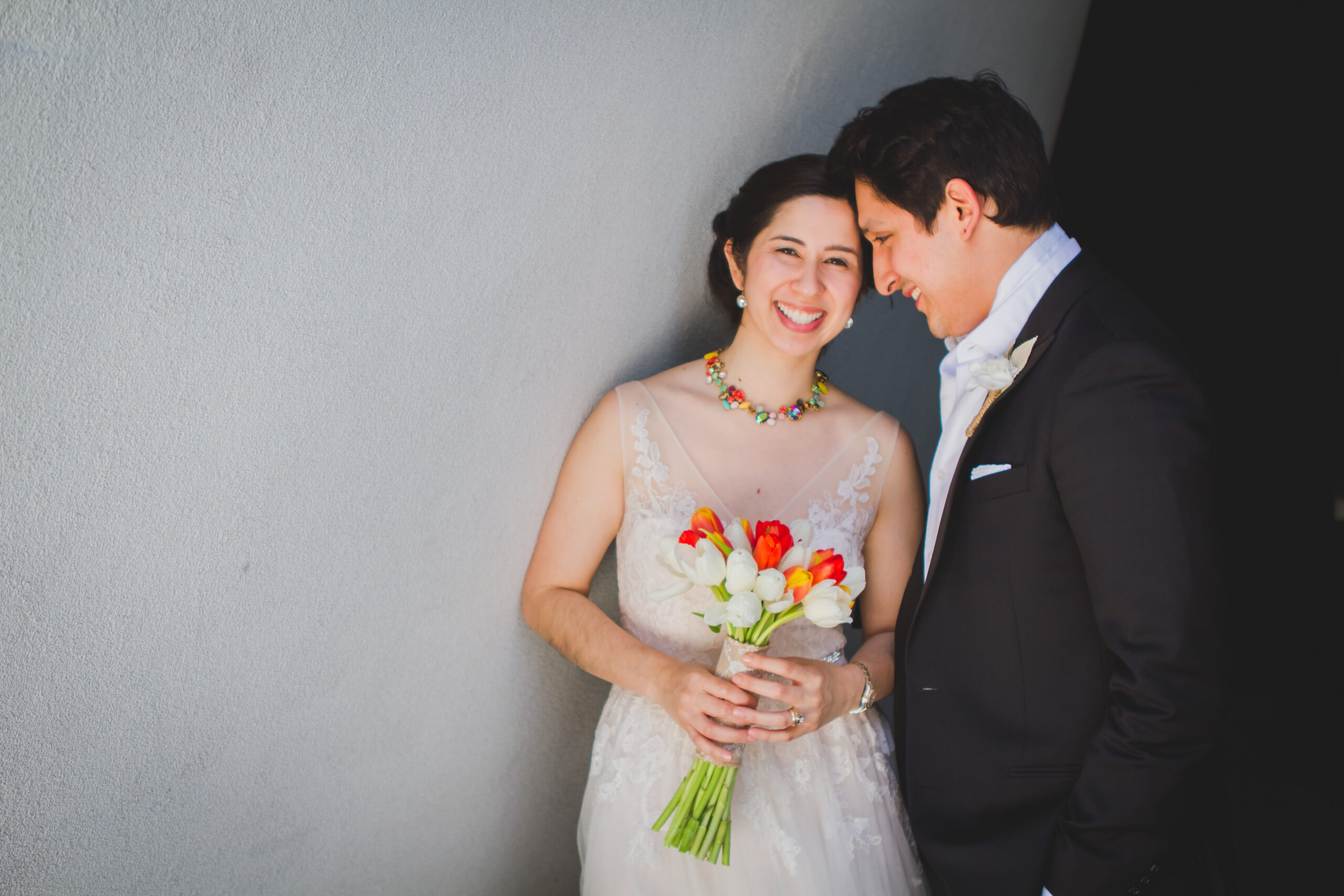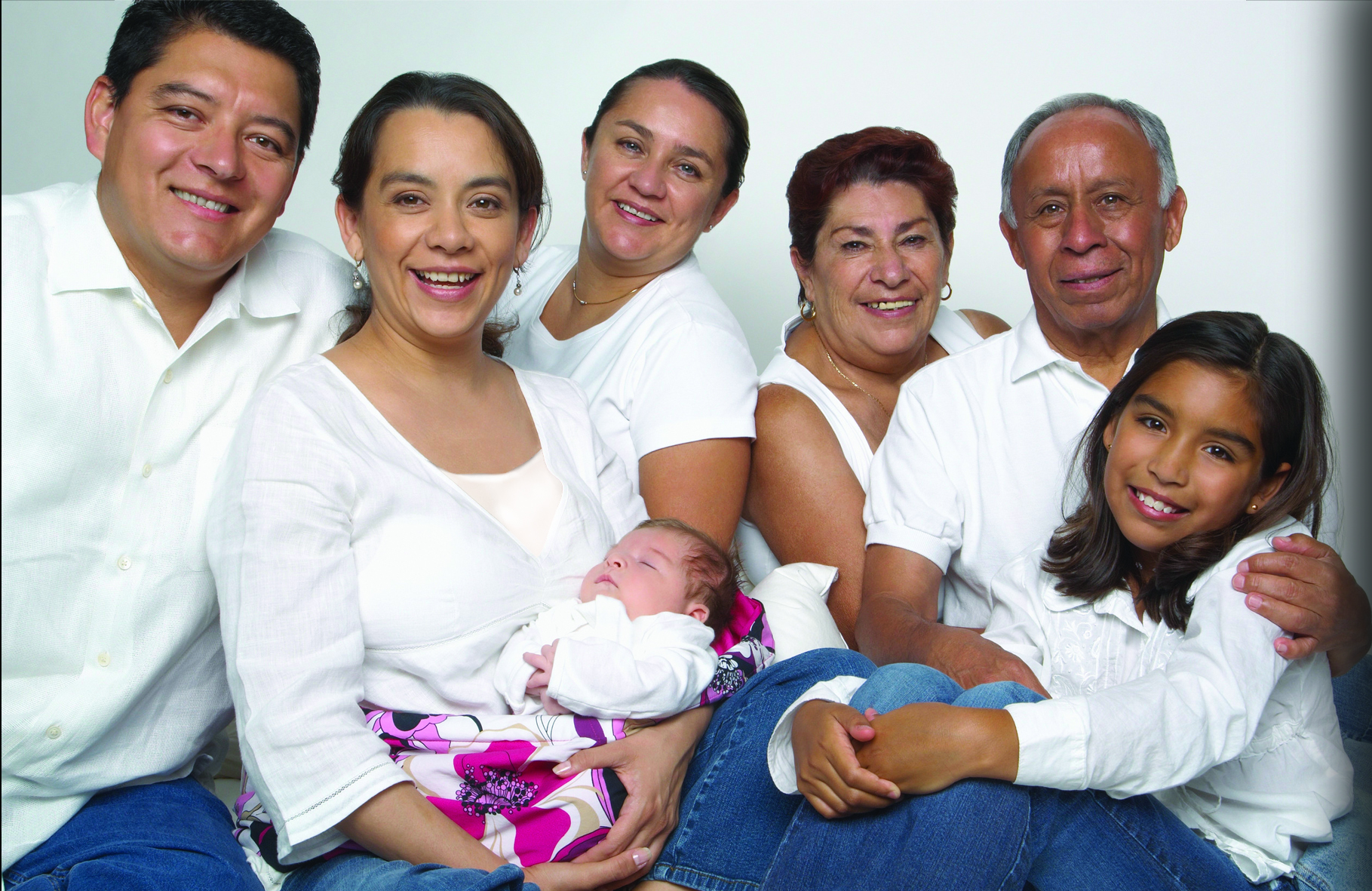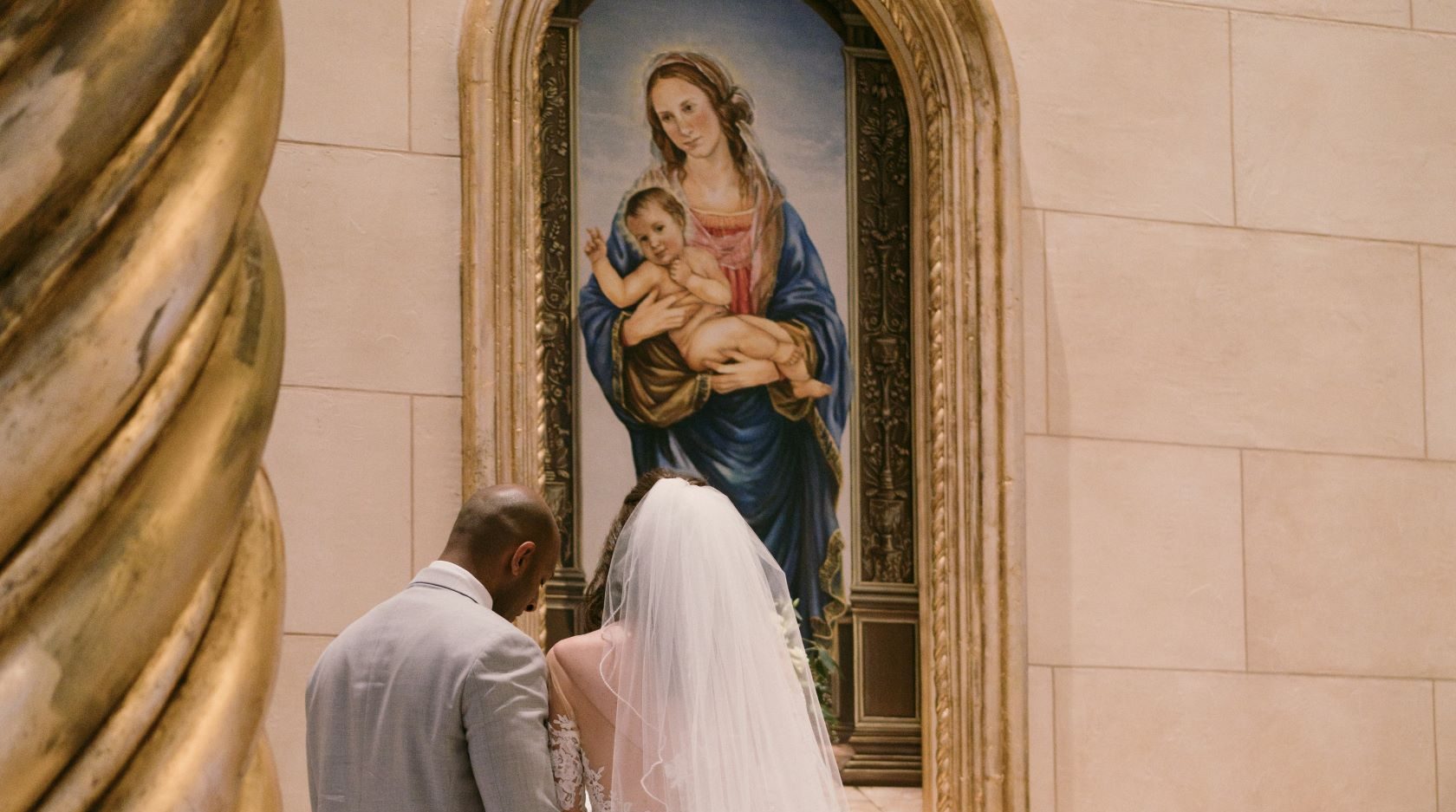Also available as a printable PDF.
Day One – Marriage: Made by God
Breaking Open the Theme
Despite many variations throughout cultures, societies, and religions, marriage has always been regarded as a sacred bond that expresses a deep, committed form of mutual love. Marriage is not, however, purely a human institution: “the married state has been established by the Creator and endowed by him with its own proper laws … God himself is the author of marriage” (GS, 48).
How is God the author of marriage?
First, “God created mankind in his image; in the image of God he created them; male and female he created them ” (Gen. 1:27). Since man and woman are created in the image of God, who is Love, man and woman carry an innate calling to love. Marriage responds to a fundamental desire and need to give and receive love.
Second, as male and female, God created man and woman with a physical complementarity that is uniquely able to collaborate in His work of creation. The very nature of man and woman is prepared for the possibility of marriage and the welcoming of new life.
Third, Holy Scripture affirms that it is good for a man and woman to belong to one another and form a bond of communion: “It is not good for the man to be alone” (Gen. 2:18) …. ” That is why a man leaves his father and mother and clings to his wife, and the two of them become one body (Gen. 2:24). In the New Testament, Jesus invokes God’s original plan for mankind as an unbreakable union of two lives by recalling the plan of the Creator in the beginning: “So they are no longer two, but one flesh” (Mt. 19:6).
In the divine plan, marriage is the exclusive, indissoluble communion of life and love entered by one man and one woman. Between two baptized Christians, this covenant is a sacrament.
Reflection
As Catholics, an understanding of God’s plan for marriage and family is an essential part of living the call to holiness. Catholic spouses are blessed with the certainty that the sacrament of marriage provides the graces necessary to become sanctified as husband and wife, father and mother. This grace endows the marriage covenant with strength and fortifies it in moments of difficulty. It also carries over into the domestic church, the home, where the family grows and becomes a witness to God’s love for others.
God’s plan for marriage is not restricted to Catholics, however. As explained above, it is rooted in the nature and identity of man and woman created in God’s image. The dignity of marriage with its specific purpose and characteristics is a good to uphold and defend to the benefit of all people.
To Think About
(Choose one or more of the following questions to reflect on by yourself and/or with your spouse)
- What makes marriage distinctive compared to other relationships? Why are love and commitment in marriage unique? What does it mean to say that God created marriage in the very same moment that he created the human person?
- As a couple, how are we complementary in our needs, desires, and attributes? How does God endow us with different gifts, as man and woman, that contribute to the marriage?
- How can we, as a couple, bear witness to the beauty and wisdom of God’s design for marriage?
Prayer of Married Couples
Almighty and eternal God,
You blessed the union of husband and wife
so that we might reflect
the union of Christ with His Church:
look with kindness on us.
Renew our marriage covenant.
Increase your love in us,
and strengthen our bond of peace
so that, [with our children],
we may always rejoice in the gift of your blessing.
We ask this through Christ our Lord. Amen.
Day Two – Marriage: Made for Love
Breaking Open the Theme
Marriage between one man and one woman responds to the deepest longing of the human heart for love and belonging. We yearn to be loved and to receive love. The same can be said of family life: in a family, children are received to be loved and to love in return.
Despite human shortcomings, the married couple and the family are reflections of God who is three divine persons in a communion of love. In marriage, the man and the woman become “one body” (Gen 2: 24), a communion of love that generates new life. In a similar way, the human family becomes a communion of love by the exchange of giving and receiving love between its members.
Marriage and family life are schools of love. They teach us how to reach a communion of love within the context of daily life: full of joys, sacrifices, trials, and hopes. In all of this, love is purified and perfected, made authentic and complete. As Christ’s sacrifice on the cross exemplified, love is laying down one’s life for another. Spouses and family members are called to do the same, each and every day.
Reflection
Despite our best efforts to love faithfully and unconditionally, marriage and family life can be difficult and challenge our ability to love continually. The marital love that is blessed by the sacrament of marriage is fortified and sustained, however, by a unique grace intended to “perfect the couple’s love and to strengthen their indissoluble unity” (CCC, 1641). By virtue of this grace, the couple helps one another to attain holiness.
The source of this grace is Christ. “Just as of old God encountered his people with a covenant of love and fidelity, so our Savior, the spouse of the Church, now encounters Christian spouses through the sacrament of Matrimony” (GS, 48). Christ dwells with them, gives them the strength to take up their crosses and so follow him, to rise again after they have fallen, to forgive one another, to bear one another’s burdens, to “be subject to one another out of reverence for Christ,” and to love one another with supernatural, tender, and fruitful love” (CCC, 1642).
To Think About
(Choose one or more of the following questions to reflect on by yourself and/or with your spouse)
- What makes the love of man and woman unique, especially within the marital relationship? What makes the love of family members a communion of persons?
- How are our marriage and family schools of love? As a couple and family, do we demonstrate a communion of love that is self-giving, pure, and sacrificial?
- As a couple, how do we rely on the grace of the sacrament of marriage to assist us in moments of challenge and difficulty?
Prayer of Married Couples
Almighty and eternal God,
You blessed the union of husband and wife
so that we might reflect
the union of Christ with His Church:
look with kindness on us.
Renew our marriage covenant.
Increase your love in us,
and strengthen our bond of peace
so that, [with our children],
we may always rejoice in the gift of your blessing.
We ask this through Christ our Lord. Amen.
Day Three – Marriage: Made for Each Other
Breaking Open the Theme
God created man and woman together and willed each for the other. “It is not good for the man to be alone. I will make a helper suited to him” (Gen. 2:18). The woman that God ‘fashions’ from the man’s rib elicits from the man a cry of wonder, an exclamation of love and communion: “This one, at last, is bone of my bones and flesh of my flesh” (Gen. 2:23). This beautiful account from the book of Genesis of the creation of Eve from Adam’s side demonstrates how woman was created specifically as a helper, companion, and suitable partner for man. Unlike any other created being, man discovers woman as another ‘I’, as sharing the same humanity (see CCC, 371).
“Man and woman were made ‘for each other’ – not that God left them half-made and incomplete: he created them to be a communion of persons, in which each can be ‘helpmate’ to the other, for they are equal as persons (“bone of my bones…”) and complementary as masculine and feminine” (CCC, 372).
Because they are equal as persons in their humanity, but complementary in their differences as masculine and feminine, man and woman contribute unique gifts to the marriage, especially the physical differences of their bodies which allow for the transmission of human life. Only through sexual difference can a husband and a wife give themselves completely to one another.
True marital union, therefore, is not possible without sexual difference; for this reason, sexual difference is essential to marriage. Sexual difference is the necessary starting point for understanding why protecting and promoting marriage as the union of one man and one woman isn’t arbitrary or discriminatory. Rather, it’s a matter of justice, truth, love, and real freedom. Only a man and a woman—at every level of their identity: biological, physiological, emotional, social, spiritual—are capable of authentically speaking the language of married love, that is, the language of total self-gift, open to the gift of the other and the gift of life.
Reflection
Our maleness or femaleness is essential to our identity as persons. Our gender is not something that is pasted onto us as an after-thought, or that is an incidental part of who we are. Male and female are two different ways of being a human person, body and soul. When we deny our identity as sexually differentiated beings, we diminish our humanity.
A conjugal or marital union comes about only through sexual difference. Only a husband and a wife have the space or capacity to truly receive each other’s distinctive sexual gift, and only a husband and a wife can make a gift of their selves to the other in that way. The beauty of the Church’s teaching on marriage, grounded in this anthropological foundation, sheds light on the responsibility of man and woman to collaborate with God in His plan for the human race.
To Think About
(Choose one or more of the following questions to reflect on by yourself and/or with your spouse)
(1) How do reason and faith not conflict when it comes to marriage? In other words, how does the sacrament of marriage, which is between a baptized man and a baptized woman, build upon, and not detract from, the basic and reasonable truths at the heart of every marriage?
(2) Do you think sexual difference, man to woman and woman to man, is understood and appreciated today? Why or why not?
(3) As a couple, how can you help others reflect on the importance of sexual difference and complementarity?
Prayer of Married Couples
Almighty and eternal God,
You blessed the union of husband and wife
so that we might reflect
the union of Christ with His Church:
look with kindness on us.
Renew our marriage covenant.
Increase your love in us,
and strengthen our bond of peace
so that, [with our children],
we may always rejoice in the gift of your blessing.
We ask this through Christ our Lord. Amen.
Day Four – Marriage: Made for Life
Breaking Open the Theme
“Male and female he created them. God blessed and God said to them: ‘Be fertile and multiply’” (Gen. 1:27-28).
Marriage is the natural human context wherein a child is properly conceived and welcomed into life as the “supreme gift of marriage” (GS, 50). And in this stance of openness and welcoming, meant to mark every aspect of married love, a husband and a wife grow closer to each other. Making a gift of himself or herself to the other as spouses and being open to children is one and the same choice and act. As Pope John Paul II taught, “Thus the couple, while giving themselves to one another, give not just themselves but also the reality of children, who are a living reflection of their love, a permanent sign of conjugal unity and a living and inseparable synthesis of their being a father and a mother” (FC, 14).
In other words, in marriage, love and life are inseparable. This is what the Church means when she teaches that the unitive and procreative meanings of married love are inseparable. In embracing each other, husband and wife embrace their capacity to conceive a child and are called to do nothing deliberate to close part of themselves to the gift of the other.
This does not mean that a child will be conceived from every act of sexual intimacy. Marriage is not a mechanical factory for the mass production of children. The Church teaches couples in their openness to life to practice responsible parenthood by discerning whether or not they have serious reasons, in keeping with God’s plan for marriage, to postpone becoming a father and a mother here and now.
“The fundamental task of the family is to serve life, to actualize in history the original blessing of the Creator – that of transmitting by procreation the divine image from person to person. (…) However, the fruitfulness of conjugal love is not restricted solely to the procreation of children, even understood in its specifically human dimension: it is enlarged and enriched by all those fruits of moral, spiritual and supernatural life which the father and mother are called to hand on to their children, and through the children to the Church and to the world” (FC, 28).
Reflection
Any honest consideration of marriage must think about children, the hope of our future. For millennia, people of every generation and of every culture have understood that the marriage of a man and a woman is the central pro-child social institution and the rock of the natural family. Marriage brings together a man and a woman who unite as husband and wife to form a unique relationship open to welcoming and caring for new life. As the union of husband and wife, marriage is a union open from within to the blessing of fruitfulness. Children are born “from the very heart” of marriage, from the mutual self-giving between husband and wife (CCC, no. 2366). They are the “supreme gift” of marriage and its “ultimate crown” (GS, nos. 50, 48).
Just as plants need the proper elements not only to begin to grow but also to flourish, children need the proper elements as well. It takes a man and a woman, with God’s help, to bring a child into existence. It makes sense that if sexual difference is essential for the beginning of life, it is also vital for the caring of that life. Mothers and fathers matter for the duration of a child’s life.
Marriage is the institution meant to ensure that a child is welcomed as a gift to be nurtured and raised by the uniquely different love that only a mother and a father can give. Just as a seedling needs the presence of soil, sunlight, and water to grow and flourish, so too a child needs the natural foundation of life and love uniquely provided in the loving marriage of a man and a woman open to the gift of a child.
To Think About
(Choose one or more of the following questions to reflect on by yourself and/or with your spouse)
(1) How are openness to life and sexual difference related? Why is this important for understanding the meaning of marriage?
(2) How do you understand and embrace the Church’s teaching on the sanctity of human life, including the Church’s teaching on the use of contraception?
(3) In what way can you witness as a couple to the sanctity and dignity of human life and the importance of mothers and fathers in the lives of their children?
Prayer of Married Couples
Almighty and eternal God,
You blessed the union of husband and wife
so that we might reflect
the union of Christ with His Church:
look with kindness on us.
Renew our marriage covenant.
Increase your love in us,
and strengthen our bond of peace
so that, [with our children],
we may always rejoice in the gift of your blessing.
We ask this through Christ our Lord. Amen.
Day Five – Marriage: Made for Freedom
Breaking Open the Theme
“Jesus answered them, ‘Amen, amen, I say to you, everyone who commits sin is a slave of sin. A slave does not remain in a household forever, but a son always remains. So if a son frees you, then you will truly be free’” (Jn. 8:34-36).The
Dominican moral theologian, Servais Pinckaers (1925-2008), identified two concepts of freedom that are in contrast to one another: freedom of indifference and freedom for excellence.
“Freedom of indifference” means seeing freedom as open and neutral toward all the available options. Every choice, in so far as it is a choice, is equally free. It is the freedom to not be forced to do anything (“freedom from coercion”). If freedom is really unconnected to any other aspect of the person or objective truth, then choosing to murder another person is just as “free” a decision as choosing to buy a meal for a homeless person. Of course, anyone would say that the person helping out another person is “using” their freedom better than the murderer, but is that saying enough? Is it just a question of using our freedom well or badly? Freedom of indifference says yes, those two people are equally free to choose good or evil.
In contrast, if you understand freedom as the “freedom for excellence”, you would say that the murderer is actually less free than the charitable giver. In doing something that is wrong, in acting against the true, objective order of things, the person choosing evil is actually diminishing or losing his (or her) freedom. It is in fact an abuse of freedom. It will not bring him (or her) happiness. Therefore, it is not a truly free choice. The freedom for excellence is the freedom to do good: the freedom to become who you are meant to be.
True freedom then is the capacity to love in truth and to choose the good. This echoes the words of the Catechism: “The more one does what is good, the freer one becomes,” and “true freedom” comes “in the service of what is good and just” (CCC, 1733).
Rightly ordered freedom, which serves true happiness, is service to others. This freedom corresponds to what a person is called to be: a gift for others.
Reflection
Marriage between a baptized man and woman requires the free consent of the will. The two spouses consent freely to make a gift of self to the other. The Catechism clarifies that to be free, the consent “must be an act of the will of each of the contracting parties, free of coercion or grave external fear” (CCC, 1628). By means of the consent, the spouses mutually give themselves to each other and become ‘one body’. The consent of the spouses is received by the priest (or deacon) in the name of the Church, followed by the blessing of the Church.
In many ways, the consent to marry is one of the most profound acts of human freedom. It is an act of freedom for excellence which opens new possibilities of greater excellence and happiness. When exercised together, husband and wife demonstrate a joint effort to become more truly who they are called to be by their sincere gifts of self.
To Think About
(Choose one or more of the following questions to reflect on by yourself and/or with your spouse)
(1) How does freedom for excellence correspond better to a Christian vision of the human person than freedom of indifference?
(2) In what ways has freedom been abused in the name of a false freedom and how has this affected marriage?
(3) Marriage in the Church requires a free consent of the will by both spouses. How was your marriage a choice made freely for excellence: in the freedom to become who you are meant to be?
Prayer of Married Couples
Almighty and eternal God,
You blessed the union of husband and wife
so that we might reflect
the union of Christ with His Church:
look with kindness on us.
Renew our marriage covenant.
Increase your love in us,
and strengthen our bond of peace
so that, [with our children],
we may always rejoice in the gift of your blessing.
We ask this through Christ our Lord. Amen.
Day Six – Marriage: Made for the Common Good
Breaking Open the Theme
“To love someone is to desire that person’s good and to take effective steps to secure it. Besides the good of the individual, there is a good that is linked to living in society: the common good. It is the good of ‘all of us’, made up of individuals, families and intermediate groups who together constitute society (CV, 7).
The common good is everyone’s responsibility. The efforts we make on a daily basis to be attentive to the needs of others are a contribution to the common good. The family is an essential component of the common good, rooted in marriage between a man and woman.
Healthy marriages model many virtues and good habits that are vital for social life. For example, joyful and sacrificial love between a man and a woman in marriage serves as an example to their children of what it means to love other people in general. Marriage advances a “genuine human ecology,” which includes a respect for and proper understanding of the human body and sexuality. At a fundamental and basic level, an intact marriage between husband and wife remains the most fertile source and well-integrated environment for new members of society.
Children who are raised in homes with their own married mother and father enjoy stability that no other family structure offers. If we consider these points, it becomes clear that marriage is important to the common good of society – the institution of marriage, properly understood as a man and a woman, bound to one another and their children, helps everyone in the society to flourish. It encourages young men and women to make promises to one another if they want to be “a couple”; it gives a societal recognition of such a promise and the community’s investment in helping the couple to keep it; and it gives children the stable homes they deserve.
Reflection
“The family founded on marriage is an irreplaceable natural institution and a fundamental element of the common good of every society” (Pope John Paul II, Address to the participants in the plenary assembly of the Pontifical Council of the Family, November 20, 2004).
The Catechism lists three essential components of the common good: respect for the person, social well-being and development, and peace. (CCC, 1905-1917) In other words, society should be ordered in such a way that people will find it easier to be good, to develop their gifts and capacities in peace, carrying out their duties and responsibilities without having to struggle against oppression or fear, able to act according to their consciences. The common good is meant to ensure that people may live a “truly human life” (CCC, no. 1908).
Strong marriages – marriages in which a man and a woman stay together for their entire lives – are good for society as well as for the couple themselves. They serve as examples to the community of the virtues of love, fidelity, and perseverance. They demonstrate the capacity of the human being to live up to his or her promises.
To Think About
(Choose one or more of the following questions to reflect on by yourself and/or with your spouse)
(1) What are the three ways marriage is good for the entire society?
(2) How does your marriage contribute to your own capacity and growth as a person? How does this in turn contribute to the benefit of your family and society?
(3) In what ways do you recognize the benefit to the common good of a stable marriage between man and woman?
Prayer of Married Couples
Almighty and eternal God,
You blessed the union of husband and wife
so that we might reflect
the union of Christ with His Church:
look with kindness on us.
Renew our marriage covenant.
Increase your love in us,
and strengthen our bond of peace
so that, [with our children],
we may always rejoice in the gift of your blessing.
We ask this through Christ our Lord. Amen.
Day Seven – Marriage: Made for Eternity
Breaking Open the Theme
Man is created to know, to love, and to serve Him in this life and enjoy His presence for eternity. The eternal reward is a beatitude which surpasses all human understanding. It is the gift of true happiness that comes from seeking the love of God above all else. The path to holiness or beatitude is paved with choices and consequences; homage to God or wealth; service to self or neighbor.
All Christians in every state or walk of life are called to holiness, or the perfection of charity. “In order to reach this perfection, the faithful should use the strength dealt out to them by Christ’s gift, so that . . . doing the will of the Father in everything, they may wholeheartedly devote themselves to the glory of God and to the service of their neighbor” (LG, 40). The way of perfection also passes by way of the Cross which calls for sacrifice, mortification, and dying to self.
Reflection
Marriage is an opportunity to become holy. On their wedding day, the spouses become each other’s primary companion for life’s journey until death. The journey towards heaven should be sustained by one’s spouse. A sacramental and prayerful life shared together can contribute to helping one another progress in holiness.
The journey of married life is also sustained by the graces provided in the sacrament of marriage which assist the spouses in their particular vocation to love and serve one another.
To Think About
(Choose one or more of the following questions to reflect on by yourself and/or with your spouse)
(1) What are some ways in which you experience daily the choices and consequences that bring us closer or farther from reaching holiness?
(2) In what ways does your marriage challenge you to become holy?
(3) Do you believe that you are each called to beatitude with God? How do you sustain one another in the walk towards holiness?
Prayer of Married Couples
Almighty and eternal God,
You blessed the union of husband and wife
so that we might reflect
the union of Christ with His Church:
look with kindness on us.
Renew our marriage covenant.
Increase your love in us,
and strengthen our bond of peace
so that, [with our children],
we may always rejoice in the gift of your blessing.
We ask this through Christ our Lord. Amen.
Church Documents
CCC – Catechism of the Catholic Church, Libreria Editrice Vaticana, 1993, Vatican, http://www.vatican.va/archive/ENG0015/_INDEX.HTM#fonte.
GS – Vatican Council II, Pastoral Constitution on the Church in the Modern World Gaudium et Spes, December 7,1965, Vatican, http://www.vatican.va/archive/hist_councils/ii_vatican_council/documents/vat-ii_cons_19651207_gaudium-et-spes_en.html.
FC – Pope John Paul II, Apostolic Exhortation Familiaris Consortio, November 22, 1981, Vatican, http://w2.vatican.va/content/john-paul-ii/en/apost_exhortations/documents/hf_jp-ii_exh_19811122_familiaris-consortio.html.
LG – Vatican Council II, Dogmatic Constitution on the Church Lumen Gentium, November 21,1964, Vatican, http://www.vatican.va/archive/hist_councils/ii_vatican_council/documents/vat-ii_const_19641121_lumen-gentium_en.html.
CV – Pope Benedict XVI, Encyclical Letter Caritas in Veritate, June 29, 2009, Vatican,
http://w2.vatican.va/content/benedict-xvi/en/encyclicals/documents/hf_ben-xvi_enc_20090629_caritas-in-veritate.html.
For a version of this retreat with only one day per page, head over to our Virtual Retreat Homepage.









